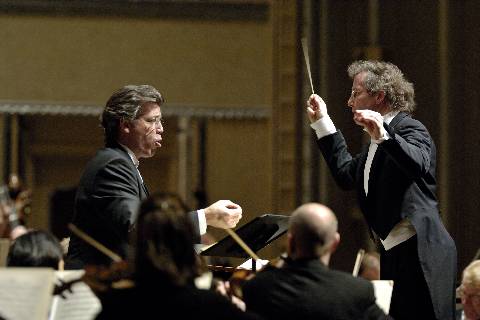|
<< -- 2 -- Kelly Ferjutz THE DEVIL IS IN THE DETAILS

However, the program notes could also have been shortened a bit in favor of printing the text -- you can't tell the players without a scorecard, as they say, and the surtitles didn't identify the words by the character doing the singing. Ordinarily this would not be a problem, either, but in this work there are thirty (!) solo parts, some very brief, some extensive. Even Faust gets doubled with the part of Dr Marianus, while Gretchen becomes Una Poenitentium.
Okay, enough of the logistics. The legend of Faust has been around for half a millennium, already. Or maybe longer. We all speak blithely of 'selling our soul to the devil' in order to gain something or other, but if such a situation presented itself in reality, we'd probably all run the other way. The story occupied the great German poet Goethe for more than twenty years, and the composer Schumann for half that. Five years ago, a performance of the entire play presented in Germany lasted for nearly 24 hours! Schumann did well to condense his version to just over two. And still, it's enormous. Goethe's version is in two parts: Schumann's is in three, while containing all the salient points.
Faust makes a pact with Mephistopheles to regain his youth. He meets and seduces Gretchen, who bears his child, then kills it. She is condemned to death, but achieves redemption, while Mephisto reclaims Faust. That's the part of the tale used by Gounod and Berlioz, but there's more. Once again, Faust bargains with Mephisto, and believing that the episode with Gretchen was a dream, he embarks on adventures before falling in love with the spirit of Helen of Troy. There's a bit of 21st century dreaming here -- Faust envisions reclaiming land from the ocean -- and, deluded, he falls prey to Mephisto once more. But no! The blinded Faust, in a state of bliss, instead goes to heaven.

Thomas Hampson as Faust and conductor Franz Welser-Möst in Severance Hall. Photo © 2006 Roger Mastroianni
|
The marvelous Thomas Hampson was Faust. Mr Hampson does not act; he becomes the character, with every gesture or facial expression elaborating on the words he sings. Or hears. Of course, he is noted for the beauty and warmth of his voice and his style, which completely exemplifies the definition of bel canto. Indeed, it is hard to imagine more beautiful singing than that done by Mr Hampson. Near the very end of the work, accompanied by harp and solo cello, Faust (or Dr Marianus) ascends to Heaven. As he sang the word Seligkeit or bliss, the expression on his face was the perfect description and definition of the word. Awesome.
Continue >>
Copyright © 15 January 2006
Kelly Ferjutz, Cleveland USA

|

